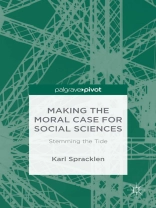The social sciences have a legitimacy problem in the modern world. The natural sciences are viewed as ‘proper science’ by journalists and policy-makers because they discover ‘truths’, make money, and help governments solve problems. In turn, defenders of the social sciences borrow the language of instrumentality, profit and policy impact. Karl Spracklen, by contrast, makes the moral case for the social sciences, arguing that they are a necessary social good capable of fighting inequality and revealing the workings of hegemonic power.
Tabla de materias
Introduction
1. The Attack on Social Sciences
2. The Weakness of the Defence
3. The Moral Case for the Social Sciences
Conclusion
Sobre el autor
Karl Spracklen is a Professor of Leisure Studies at Leeds Beckett University, UK. He is an active scholar in leisure studies, sociology and music studies. He was Chair of the Leisure Studies Association, and is the author of over seventy publications, including Whiteness and Leisure (2013), and Digital Leisure (2015).












